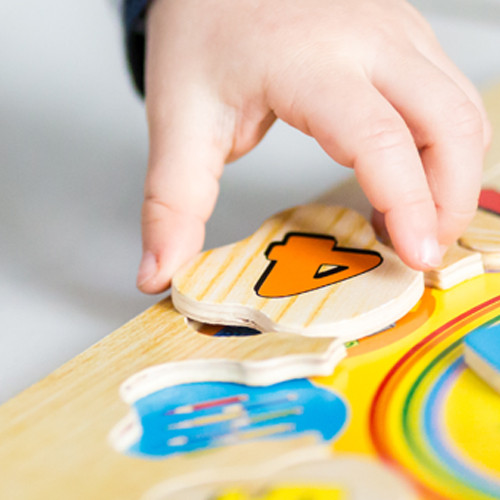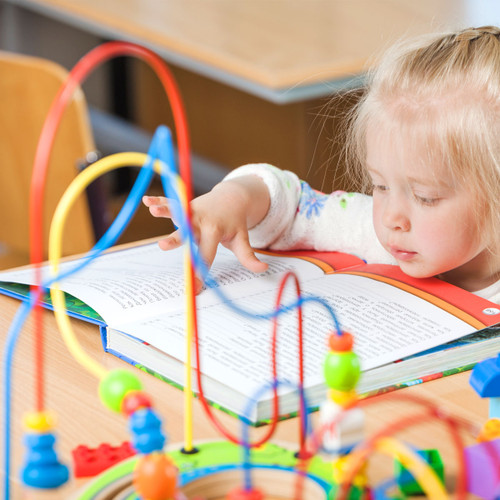Small Hands, Big Impact: The Importance of Fine Motor Skills in Early Years Education
In the bustling world of early childhood education, we often come across terms like "fine motor skills" and their significance in a child's development. But what exactly are fine motor skills, and why do they hold such importance in the early years?
If you're an early years provider seeking to enhance your understanding of this essential aspect of child development, you're in the right place!
As dedicated early years providers, your role extends far beyond simply supervising children and facilitating play. You have the remarkable opportunity to nurture and support the growth of young minds in their formative years.
Fine motor skills, the small yet mighty abilities involving precise movements of the hands, fingers, and wrists, are a cornerstone of a child's development. And by understanding the value of fine motor skills and incorporating targeted activities into your curriculum, you can empower children to unlock a world of possibilities.
In this blog post, we'll embark on a journey to explore the fascinating realm of fine motor skills. We'll delve into what they are, why they matter, and how early years providers like you can play a pivotal role in fostering their development. So, let's dive in and uncover the secrets to unlocking the potential of fine motor skills in the young children under your care!
What are fine motor skills?
Fine motor skills involve the precise movements and coordination of the small muscles in the hands, fingers, and wrists.
These abilities are essential for a child's overall development and have a significant impact on their academic success, self-care tasks, and social interactions.
When children develop their fine motor skills, they acquire the dexterity and control necessary to perform important tasks like holding a pencil, buttoning a shirt, or using utensils effectively.
However, the importance of fine motor skills goes beyond practical applications.
They are closely connected to cognitive development, as the brain and hands work together to execute precise movements. Developing fine motor skills enhances hand-eye coordination, spatial awareness, problem-solving abilities, and concentration, laying a solid foundation for future learning and overall development.
The Importance of Fine Motor Skills
Fine motor skills are fundamental to early years development, supporting a wide range of critical abilities. They are essential for academic success, enabling children to actively participate in classroom activities and express their ideas.
Furthermore, well-developed fine motor skills facilitate independent self-care tasks and enhance social interactions with peers.
Beyond these specific areas, fine motor skills have a profound impact on cognitive development, language and communication, emotional well-being, and the acquisition of life skills.
And ultimately lay the groundwork for a child's development, empowering them to thrive academically, socially, and emotionally.
Difference Between Fine Motor Skills and Gross Motor Skills
Fine motor skills and gross motor skills are two distinct categories of motor skills that children develop during their early years. While both types involve physical movement, they differ in the muscles and coordination involved.
A. Fine Motor Skills:
Fine motor skills involve the precise control and coordination of the small muscles in the hands, fingers, and wrists. These skills are responsible for activities that require intricate movements and dexterity.
Examples of fine motor skills include:
● Using a pencil or crayon to draw or write
● Manipulating small objects like building blocks or puzzle pieces
● Buttoning or zipping up clothing
● Tying shoelaces
● Using scissors to cut along lines.
B. Gross Motor Skills:
In contrast, gross motor skills involve the coordination and movement of the large muscles of the body. These skills are necessary for activities that require whole-body movements and physical coordination.
Examples of gross motor skills include:
● Running, jumping, and hopping
● Climbing and balancing
● Throwing and catching a ball
● Riding a bicycle
● Skipping or hopping on one foot.
Understanding the difference between fine motor skills and gross motor skills is crucial for early years providers as it helps in designing appropriate activities and interventions to support children's overall motor development.
5 Important Benefits of Fine Motor Skills (with actionable tips)
Fine motor skills are not only essential for everyday tasks but also offer a range of benefits that positively impact a child's development. Here are ten important benefits of fine motor skills:
A. Benefit 1: Improved Hand-Eye Coordination:
Fine motor activities play a significant role in enhancing hand-eye coordination in young children. Hand-eye coordination refers to the ability to coordinate the movements of the hands and fingers with visual information from the eyes. By engaging in activities that require precise hand movements, children develop and refine their hand-eye coordination skills.
- Fine motor activities such as lacing and threading, building with blocks, or playing with puzzles require children to coordinate their hand movements with visual cues. As they manipulate objects and make precise adjustments, their hand-eye coordination improves.
- Artistic activities like drawing, colouring, and painting also contribute to the development of hand-eye coordination. Children learn to control their hand movements while staying within the lines or creating specific shapes and patterns.
By promoting hand-eye coordination, fine motor skills lay a solid foundation for future tasks that require precise manual dexterity, such as writing, playing musical instruments, or engaging in sports activities.
B. Benefit 2: Enhanced Pre-Writing and Pre-Reading Skills
Fine motor skills play a crucial role in developing the foundational skills needed for successful pre-writing and pre-reading abilities in young children. Here's how fine motor skills contribute to these important skills:
Fine motor skills and pre-writing skills: Fine motor skills directly influence a child's ability to hold and control a writing instrument, such as a pencil or crayon. By engaging in fine motor activities, children develop the strength and dexterity required for proper pencil grip and controlled hand movements. These skills are essential for letter formation, line tracing, and eventually, writing words and sentences.
Fine motor skills and pre-reading skills: Fine motor skills also support the development of pre-reading abilities. Activities that involve manipulating small objects, turning pages in a book, or pointing to pictures help children refine their finger coordination and control. These skills contribute to their ability to accurately track print from left to right, focus on specific words or letters, and eventually decode and comprehend written language.
To support pre-writing and pre-reading development, early years providers can implement the following strategies and activities:
● Provide opportunities for fine motor play: Offer a variety of materials such as playdough, finger paints, or sand trays that encourage children to manipulate and explore with their fingers. These activities strengthen hand muscles and improve fine motor control.
● Engage in finger exercises: Encourage finger exercises like squeezing small balls, using clothespins to pick up objects, or playing with small building blocks. These activities help build finger strength and coordination.
● Practice tracing and drawing: Introduce tracing activities that involve following lines and shapes with a pencil or crayon. Gradually progress to drawing simple shapes and lines independently. These exercises enhance hand-eye coordination and fine motor control.
● Use fine motor tools: Introduce tools like child-friendly scissors, tweezers, or hole punches to help children develop their fine motor skills while engaging in fun and purposeful activities.
By incorporating these strategies and activities into early years education, educators can effectively support children in developing the fine motor skills necessary for successful pre-writing and pre-reading abilities.
C. Benefit 3: Increased Independence in Daily Activities
Fine motor skills play a vital role in fostering independence in young children, enabling them to perform daily tasks with greater autonomy. Here's how fine motor skills facilitate independence:
Developing self-help skills: Fine motor skills are essential for self-help tasks such as dressing, grooming, and feeding. Children with well-developed fine motor skills can manipulate buttons, zippers, shoelaces, and utensils, allowing them to dress themselves, brush their teeth, and feed themselves independently.
Enhancing fine motor control: Fine motor skills contribute to the development of precise movements and coordination, enabling children to perform tasks that require control and precision. For instance, activities like pouring liquids, opening containers, or using scissors to cut paper require refined fine motor control, which empowers children to complete these tasks independently.
Encouraging organisation and tidiness: Fine motor skills also contribute to organizational abilities. Children with developed fine motor skills can sort and arrange objects, clean up their play areas, and manage their belongings effectively. This promotes a sense of responsibility and independence in maintaining an organized environment.
To promote independence and self-help skills, early years providers can incorporate the following activities:
● Dressing practice: Provide opportunities for children to practice putting on and taking off clothes, fastening buttons, and zipping zippers. Encourage them to choose their own fancy dress outfits and dress themselves with minimal assistance.
● Feeding exercises: Encourage children to use utensils, such as spoons or forks, to feed themselves. Offer age-appropriate foods that allow them to practice their fine motor skills while enjoying a meal.
● Life skills practice: Introduce activities that simulate real-life scenarios, such as setting up a pretend kitchen or grocery store. Encourage children to engage in activities like pouring water, arranging play food, or using play tools, which enhance their fine motor skills and promote independence.
By providing opportunities for children to practice and refine their fine motor skills, early years providers help them develop the independence and self-help skills necessary for daily activities.
D. Benefit 4: Strengthened Cognitive Development
Fine motor skills have a profound impact on cognitive development in early years, fostering essential cognitive abilities and problem-solving skills. Here's how fine motor activities contribute to cognitive development:
Building neural connections: Fine motor activities engage the brain and require coordination between the hands, fingers, and the mind. This engagement helps in building neural connections and strengthening the pathways between different regions of the brain. As a result, children develop enhanced cognitive abilities, including memory, attention, and information processing.
Enhancing problem-solving skills: Fine motor activities often involve problem-solving elements that require children to plan, analyse, and find solutions. For example, constructing with building blocks or puzzles requires children to think critically, strategize, and manipulate objects to achieve their desired outcome. These activities promote the development of problem-solving skills, spatial awareness, and logical thinking.
Stimulating creativity and imagination: Fine motor activities provide opportunities for children to express their creativity and imagination. Drawing, painting, and sculpting not only improve fine motor skills but also encourage imaginative thinking, self-expression, and the ability to visualize and represent ideas. This fosters cognitive development by expanding their creative thinking and visual-spatial skills.
To promote cognitive development through fine motor activities, early years providers can implement the following strategies:
● Offer open-ended art materials: Provide a variety of art supplies such as crayons, markers, paints, and clay to encourage children to explore and create freely. This allows them to exercise their fine motor skills while stimulating their imagination and cognitive abilities.
● Problem-solving games and puzzles: Incorporate games, puzzles, and manipulative toys that require children to think critically, strategize, and solve problems. These activities challenge their cognitive abilities, promote logical thinking, and improve fine motor skills simultaneously.
● Sensory play experiences: Engage children in sensory play activities that involve manipulating different textures, pouring and measuring materials, and exploring cause-and-effect relationships. These experiences stimulate their senses, encourage exploration, and enhance cognitive development through hands-on engagement.
By integrating fine motor activities that promote problem-solving, creativity, and imaginative thinking, early years providers support the cognitive development of young children.
Conclusion
Fine motor skills are vital in early childhood education, impacting various aspects of a child's life. They involve precise movements of small muscles in the hands, fingers, and wrists, contributing to academic success, self-care tasks, and social interactions.
We discussed ten key benefits of fine motor skills, including improved hand-eye coordination, enhanced pre-writing and pre-reading skills, increased independence in daily activities, strengthened cognitive development, and positive emotional and psychological well-being.
Early years providers play a crucial role in supporting fine motor skill development. By integrating fine motor activities into their programs, they can enhance children's overall development and prepare them for future learning.
Prioritizing fine motor skill development leads to long-term benefits such as academic achievement, self-confidence, problem-solving abilities, and overall well-being. Let's remember the value of fine motor skills and empower young learners by nurturing their development. Together, we can create a world where every child can thrive. Explore our wide range of resources designed specifically for promoting fine motor skill development in young children.
But that's not all! When you shop with us, you'll also enjoy:
FREE Delivery when you spend over £25: Take advantage of our free delivery service on orders over £25, making it even easier to access the resources you need.
Next Day Delivery on orders placed before 4pm: Need your resources urgently? Place your order before 4pm and receive them the next day, ensuring you can start incorporating fine motor activities into your program without delay.
12-month 100% Played With Happiness Satisfaction Guarantee: We stand behind the quality of our products. If you're not completely satisfied with your purchase within the first 12 months, we offer a 100% played-with-happiness satisfaction guarantee. Your satisfaction is our priority.
Don't miss out on this opportunity to provide young learners with the tools they need for fine motor skill development. Visit our website today to explore our early years resources and make a positive impact on their growth.



